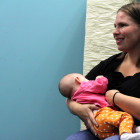Breastfeeding Rates On The Rise, As Mother-Baby Support Systems Expand
|
Candid online posts describing the challenges of breastfeeding fill the Facebook page of Breastfeeding USA’s Connecticut chapter. The daily stream of anecdotes, questions and comments alternate in tone from exasperated to celebratory. “Small victory for today. I actually breastfed in the open with my husband and day care provider in the same room (with a nursing cover, of course), but I haven’t done that yet, so I feel good about it. “
“Any tips to get better pumping results?


